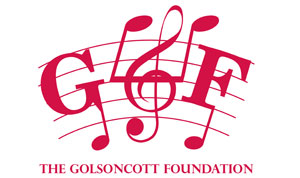 Deadline: 5pm on Friday 23 February 2024
Deadline: 5pm on Friday 23 February 2024
This training bursary is targeted at trainees and prospective musical instrument making trainees who are experiencing financial hardship. It is sponsored by the Golsoncott Foundation and Jennifer Chen and is one of a suite of awards and bursaries offered by Heritage Crafts to support and celebrate heritage craftspeople.
Apply for up to £4,000 to start training in a musical instrument making craft or to further develop your skills.
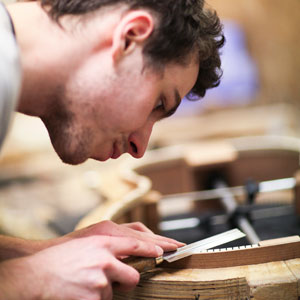 Many people are dissuaded from training in musical instrument making because of the cost, and therefore the make-up of the sector is not truly representative of the mix of backgrounds that make up the UK as a whole. This bursary has been set up to help cover or subsidise the cost of training for someone who would otherwise be prevented from pursuing this career path as a result of the cost.
Many people are dissuaded from training in musical instrument making because of the cost, and therefore the make-up of the sector is not truly representative of the mix of backgrounds that make up the UK as a whole. This bursary has been set up to help cover or subsidise the cost of training for someone who would otherwise be prevented from pursuing this career path as a result of the cost.
You could be just starting out on your journey in musical instrument making or at the point where you want to turn a hobby into a career, or you could already be a maker who is looking to further refine your skills.
Musical instrument crafts can include, but are not limited to, the making of complete instruments (such as bagpipes, guitars, steel pans and so on ), or to the specific skills that go into making an instrument (such as strings, valves, keys and so on).
If you are new to a craft and are struggling to find the right training for you, after your own research, please get in touch and we may be able to support. Successful applicants will be supported by the Heritage Crafts team to develop an action plan. We will work with you to monitor progress and support you to achieve your aims.
What can this grant be used for?
There are a number of routes to learning a craft skill. Applicants can apply for a grant for any amount up to £4,000 which can cover or contribute towards:
- the costs of training with a craftsperson;
- the costs of attending a specialist training course;
- the costs of attending an accredited training course;
- undertaking a self-directed programme of training with one or more craftspeople;
- the cost of specialist tools or materials, books or study materials or low cost travel (no more than 25% of total budget).
The bursary cannot be used for general living expenses, research, promotional activities or anything else. Successful applicants will be supported by the Heritage Crafts team. We will work with to you monitor progress and support you to achieve your aims.
How to apply
Please apply by filling out the form below. We will also accept a video application of no more than 15 minutes in length in which you address all of the questions in the form below. You can access a list of questions here.
The deadline for applications is 5pm on Friday 23 February 2024. If you have any questions or need assistance with the application process, please email Tess Osman at tess@heritagecrafts.org.uk.
Assessment, shortlisting and final selection will be carried out by the Heritage Crafts judging team, and interviews will be carried out by Zoom. If you are new to a craft and you would like assistance with finding a trainer, please get in touch and we will do what we can to help.
Deadline: 5pm on Friday 23 February 2024
 This training bursary is targeted at trainees and prospective trainees of fashion textile crafts who are experiencing financial hardship. It is sponsored by The Costume Society and is one of a suite of awards and bursaries offered by Heritage Crafts to support and celebrate heritage craftspeople.
This training bursary is targeted at trainees and prospective trainees of fashion textile crafts who are experiencing financial hardship. It is sponsored by The Costume Society and is one of a suite of awards and bursaries offered by Heritage Crafts to support and celebrate heritage craftspeople.
Apply for up to £4,000 to start training in a fashion textile craft or to further develop your skills.
 Many people are dissuaded from training in fashion textile crafts because of the cost, and therefore the make-up of the sector is not truly representative of the mix of backgrounds that make up the UK as a whole. This bursary has been set up to help cover or subsidise the cost of training for someone who would otherwise be prevented from pursuing this career path as a result of the cost.
Many people are dissuaded from training in fashion textile crafts because of the cost, and therefore the make-up of the sector is not truly representative of the mix of backgrounds that make up the UK as a whole. This bursary has been set up to help cover or subsidise the cost of training for someone who would otherwise be prevented from pursuing this career path as a result of the cost.
You could be just starting out on your journey in fashion textile crafts or at the point where you want to turn a hobby into a career, or you could already be a maker who is looking to further refine your skills.
Fashion textile crafts can include, but are not limited to, dressmaking, tailoring, pattern cutting, hat making, millinery, glovemaking, fabric pleating, corset making, and so on. Applications for training that prioritises the acquisition of practical hand skills will be favoured over training that is predominantly theoretical or design-oriented.
If you are new to a craft and are struggling to find the right training for you, after your own research, please get in touch and we may be able to support. Successful applicants will be supported by the Heritage Crafts team to develop an action plan. We will work with you to monitor progress and support you to achieve your aims.
What can this grant be used for?
There are a number of routes to learning a craft skill. Applicants can apply for a grant for any amount up to £4,000 which can cover or contribute towards:
- the costs of training with a craftsperson;
- the costs of attending a specialist training course;
- the costs of attending an accredited training course;
- undertaking a self-directed programme of training with one or more craftspeople;
- the cost of specialist tools or materials, books or study materials or low cost travel (no more than 25% of total budget).
The bursary cannot be used for general living expenses, research, promotional activities or anything else. Successful applicants will be supported by the Heritage Crafts team. We will work with to you monitor progress and support you to achieve your aims.
- Bursaries will be only awarded to crafts used in the creation of garments and accessories that include a substantial element of textiles.
- Fabric textile production is eligible if it is intended for garment and accessory making, but not for things like upholstery or tapestry.
- Footwear production that involves stitching is eligible.
- Hat making and millinery are eligible.
- Wig making is eligible, but only if it for costume.
- Button and fastening making and ribbon weaving are eligible, but only if they are for garments or accessories.
- Jewellery making is only eligible if it is of a type that is ineligible for our precious metal bursaries.
- Watchmaking is not eligible.
How to apply
Please apply by filling out the form below. We will also accept a video application of no more than 15 minutes in length in which you address all of the questions in the form below. You can access a list of questions here.
The deadline for applications is 5pm on Friday 23 February 2024. If you have any questions or need assistance with the application process, please email Tess Osman at tess@heritagecrafts.org.uk.
Assessment, shortlisting and final selection will be carried out by the Heritage Crafts judging team, and interviews will be carried out by Zoom. If you are new to a craft and you would like assistance with finding a trainer, please get in touch and we will do what we can to help.
 YEAR 2 THEME: ENDANGERED CRAFTS
YEAR 2 THEME: ENDANGERED CRAFTS
Deadline for applications: 12 February 2024
Online information session: 25 January 2024, 4pm
The Society of Antiquaries of London is partnering with Heritage Crafts for a second year to call for Heritage Crafts member craftspeople who practice endangered crafts to submit expressions of interest in becoming the 2024 Maker in Residence (MiR) at Kelmscott Manor, the former home of internationally renowned writer, designer-craftsman, conservationist and revolutionary socialist, William Morris.
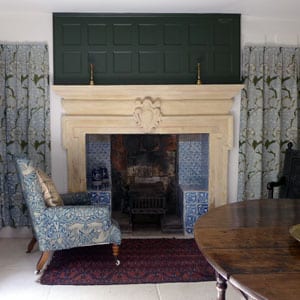 For 25 years everything about the 17th-century Manor was of profound inspiration to William Morris. Both the Manor and its setting in rural Oxfordshire were a fertile source of ideas, influencing his art, literature and social thinking as well as his passionate, imaginative engagement with history and nature. Integral to Morris’s ethos was his tireless championing of heritage crafts and the handmade. Morris’s values have never been more relevant than they are today.
For 25 years everything about the 17th-century Manor was of profound inspiration to William Morris. Both the Manor and its setting in rural Oxfordshire were a fertile source of ideas, influencing his art, literature and social thinking as well as his passionate, imaginative engagement with history and nature. Integral to Morris’s ethos was his tireless championing of heritage crafts and the handmade. Morris’s values have never been more relevant than they are today.
As part of the Society of Antiquaries’ NLHF-funded £6 million Kelmscott and Morris: Past, Present and Future project, the Kelmscott Manor residency is a unique opportunity for the successful candidate to reflect Morris’s advocacy of the handmade and contribute to his legacy by playing a distinctive part in the Manor’s programme of public engagement.
This year (2024) will see the second of three residencies by members of Heritage Crafts, and for this year will focus specifically on ‘endangered’ and ‘critically endangered’ crafts as featured in the 2023 edition of the Red List of Endangered Crafts (https://heritagecrafts.org.uk/redlist). The project presents an opportunity to showcase endangered crafts in an iconic rural setting visited annually by over 27,000 people. At the heart of the ‘new’ Kelmscott Manor is our determination to reflect William Morris’s inclusivity: ‘I do not want art for a few, any more than education for a few or freedom for a few’, by building its appeal and accessibility to a wider base of audiences through providing the richest experience possible.
What we are looking for
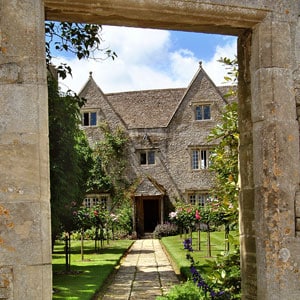 William Morris once described Kelmscott Manor’s beauty and atmosphere as very stimulating to the imagination. We are seeking an MiR who will be as inspired by it as Morris was over 150 years ago, and who can inspire and enthuse others by encouraging creative engagement. The MiR will be a professional working in an endangered craft that features in the 2023 edition of the Red List; we are keen to emphasise to potential applicants that our interest is not limited to practitioners of one of the crafts Morris himself was interested in or practiced.
William Morris once described Kelmscott Manor’s beauty and atmosphere as very stimulating to the imagination. We are seeking an MiR who will be as inspired by it as Morris was over 150 years ago, and who can inspire and enthuse others by encouraging creative engagement. The MiR will be a professional working in an endangered craft that features in the 2023 edition of the Red List; we are keen to emphasise to potential applicants that our interest is not limited to practitioners of one of the crafts Morris himself was interested in or practiced.
The MiR will be a practitioner with the ability to recognise and mediate the unique qualities of Kelmscott and the legacy of Morris’s life and work here. It is important that they have excellent communication skills and enjoy working with people. Experience of working in an educational context would be an advantage. The MiR will need to adapt to working on a small and busy site; although they will wherever possible be supported by staff and/or volunteers, they must also be confident in working on their own.
What we’ll ask of you
- a commitment to work in residence at Kelmscott Manor, responding creatively to the Manor and/or its site and setting
- a commitment of 25 days’ scheduled attendance on site, spread between April and the end of October 2024. These will incorporate getting to know the estate and collections; preparing and creating work; delivering the activities stated below.
- to provide a minimum of FOUR family-friendly workshops on Open Days (Thur, Fri, Sat)
- to provide a minimum of FOUR demonstrations on Open Days (Thur, Fri, Sat)
- to provide a minimum of TWO workshops for school or community groups (Mon, Tues) or produce resources for use by those groups
- to work in collaboration with the Manor to create ONE digital asset
- to create ONE asset (to be completed by 1 September) to be retained by the Manor (in the collections, including Learning & Outreach) or for disposal for fundraising purposes to benefit the Learning & Outreach Programme.
In return
The successful applicant will be offered a Residency over a period of seven months (April to the end of October 2024). This is an exciting opportunity for the MiR to foster a wider understanding of their craft and its heritage significance, to develop their practice and create new work whilst based at a site of international renown.
- The MiR will be paid a fee of £300 per day (a proportion of the fee can be paid in advance)
- £2,500 is available towards the cost of materials
- An additional £3,000 is available towards travel/accommodation (to be claimed retrospectively on a monthly basis)
- The MiR will be provided with a (fully accessible) small studio space with sink in the Learning Barn at the Manor
- The equivalent of TWO days’ dedicated time with the Curator, who for research purposes can provide access to archive material and collections in store
Practicalities
The pattern for the residency is entirely flexible and will depend on the successful proposal. We ask that a substantial proportion of time will be spent in or around the Manor and site. As the Manor is a Grade I Listed Building certain site restrictions may apply. The project partners will seek to facilitate the MiR’s wishes where possible; however these restrictions should be recognised from the outset.
The majority of the buildings have step-free access, including the Learning Barn where the MiR will have their studio space. There is step-free access to the ground floor of the Manor, but access to the upper floors are via stairs only. We are committed to supporting any access requirements of the MiR and ensuring that there are no barriers to participation in the residency.
An agreement setting out the residency outcomes and commitments will be discussed and agreed with the successful candidate in advance of the residency commencing. A DBS check will be required.
Management
On a day-to-day basis the project will be managed by Hannah Britton (Learning & Outreach Officer) and Carrie Marks (Visitor & Volunteer Manager).
Timetable
- Online information session about Kelmscott Manor and the Residency – 25 January 2024, 4pm to 5pm (to attend please register here)
- Deadline for applications – 12 February 2024
- Interviews (to be held at Kelmscott Manor) – 4 March 2024
- Appointment of MiR – 1 April 2024
- Residency period – flexible between April and end of October 2024
Who is eligible to apply
- Residents of the UK
- Aged 18 and above
- Member of Heritage Crafts (click here to become a member for £20 a year)
- Practice an ‘endangered’ or ‘critically endangered’ crafts as featured in the 2023 edition of the Red List of Endangered Crafts
- Have at least THREE years’ experience in your chosen craft
Information session
We will be running an information session to provide more details about Kelmscott Manor and Morris’ legacy, and to answer any of your questions, on Zoom on Thursday 25 January 2024, 4pm to 5pm. To attend please register here: https://zoom.us/meeting/register/tJcqc-muqDsvHtxGWLN91T86Y0mMYLcDs__n#/registration
Application procedure
Your application should consist of a 1-page proposal, a 1-page curriculum vitae and up to 6 images of recent work. Please also include the name and address of two referees, at least one of whom should be a professional contact.
Applications should be emailed to Kathy Haslam (kathyhaslam@kelmscottmanor.org.uk) and Hannah Britton (hannah.britton@kelmscottmanor.org.uk).
Please ensure your application email has ‘Maker in Residence’ in the subject line and that it is sent to both of the contact emails specified here. The deadline for applications is 12 February 2024. If you encounter any difficulties with the application process, please contact Kathy or Hannah via email or telephone on 01367 252486.
A thatching spar maker, a pigment maker, and a boatbuilder are among the recipients of a new round of grants to help safeguard some of the UK’s most endangered craft skills.
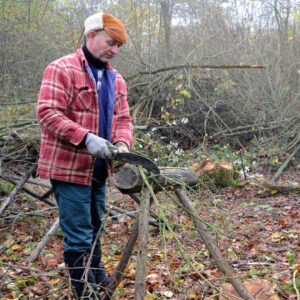 Heritage Crafts has awarded the grants through its Endangered Crafts Fund, which was launched in 2019 to increase the likelihood of at-risk craft skills surviving into the next generation. Six of this round’s grants are funded by the Sussex Heritage Trust, the Ashley Family Foundation for Wales, and the Essex Community Foundation and were ring fenced for crafts practitioners within those areas.
Heritage Crafts has awarded the grants through its Endangered Crafts Fund, which was launched in 2019 to increase the likelihood of at-risk craft skills surviving into the next generation. Six of this round’s grants are funded by the Sussex Heritage Trust, the Ashley Family Foundation for Wales, and the Essex Community Foundation and were ring fenced for crafts practitioners within those areas.
In May this year Heritage Crafts published the fourth edition of its groundbreaking Red List of Endangered Crafts, the first research of its kind to rank the UK’s traditional crafts by the likelihood that they will survive into the next generation. The report assessed 259 crafts to ascertain those which are at greatest risk of disappearing, of which 84 were classified as ‘endangered’ and a further 62 as ‘critically endangered’.
The nine successful recipients are:
- Andy Basham from Essex, for himself and others to learn to make thatching spars from the last spar maker in East Anglia, and equip himself for production from his hazel coppice.
- Will Holland from Carmarthenshire, to develop his arrowsmithing skills and master the reproduction of historically forged arrowheads, and to teach the craft to others.
- Charlotte Kenward from West Sussex, to train and equip herself to offer traditional reverse gilded house numbers and signage to heritage properties.
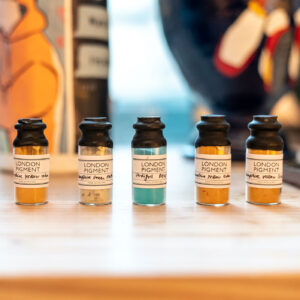 Lucy Mayes from London, to purchase equipment to produce a range of innovative and sustainable pigments from processing construction waste.
Lucy Mayes from London, to purchase equipment to produce a range of innovative and sustainable pigments from processing construction waste.- Gail McGarva and the team at Building Futures Galloway, to equip a community workshop on the Solway Firth with tools needed to teach young people traditional wooden boatbuilding.
- Rob Shaw and team, from North Yorkshire, to equip the new coach trimming workshop of Embsay & Bolton Abbey Steam Railway, offering a space to train more of their volunteers.
- Travis Smith from Hampshire, to train in hand hewing of timber and apply his skills to the restoration and reconstruction of historical building and the construction of new ones.
- Stephanie Turnbull from Newport, to trial the use of alternative types of limestone and other stone substrates for lithographic printing, and to publish her findings.
- Jessie Watson-Brown, Matthew Bailey and Jamey Rhind-Tutt from Devon, to equip a new tannery to produce traditional bark-tanned leather from wild deer skins.
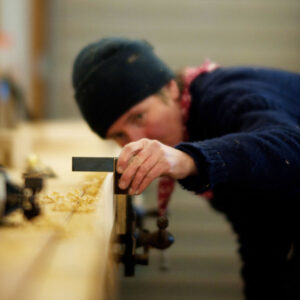 These nine projects follow 57 others awarded in previous rounds, covering endangered crafts such as coppersmithing, Highland thatching, sailmaking and many more. Previous funders have included the Radcliffe Trust, the Pilgrim Trust, the Dulverton Trust, the Swire Charitable Trust and others, as well as individuals who have donated sums from £5 right up to several thousands of pounds.
These nine projects follow 57 others awarded in previous rounds, covering endangered crafts such as coppersmithing, Highland thatching, sailmaking and many more. Previous funders have included the Radcliffe Trust, the Pilgrim Trust, the Dulverton Trust, the Swire Charitable Trust and others, as well as individuals who have donated sums from £5 right up to several thousands of pounds.
As usual the fund was oversubscribed, and Heritage Crafts hopes to work with many of the unsuccessful candidates to identify other funding and support opportunities.
Mary Lewis, Heritage Crafts Endangered Crafts Manager, said:
“The survival of endangered craft skills relies on the people who make a positive choice to learn, make and teach these crafts. These projects will provide future generations with opportunities that they might not otherwise have, to become productive and healthy members of our shared craft community and to safeguard this important part of our national heritage.”
View the full list of the 66 grants awarded to date
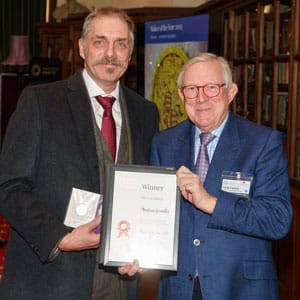 Traditional sign painter Andrew Grundon has won Maker of the Year in the 2023 Heritage Crafts Awards, which was presented at a prestigious Winners’ Reception at the College of St George, Windsor Castle on 15 November 2023, sponsored by The Royal Mint.
Traditional sign painter Andrew Grundon has won Maker of the Year in the 2023 Heritage Crafts Awards, which was presented at a prestigious Winners’ Reception at the College of St George, Windsor Castle on 15 November 2023, sponsored by The Royal Mint.
The award, supported by the Marsh Charitable Trust, was one of 14 revealed at the ceremony introduced by Heritage Crafts Co-Chair Jay Blades MBE, including the fourth annual President’s Award for Endangered Crafts set up by Heritage Crafts President the former Prince of Wales and won by straw hat maker Lucy Barlow, the inaugural Precious Metalworker of the Year Award sponsored by The Royal Mint and won by watch dial enameller Sally Morrison, and the Woodworker of the Year Award sponsored by Axminster Tools and won by woodcarver Tom Ball.
The Heritage Crafts/Marsh Maker of the Year award was won by traditional sign painter Andrew Grundon. Andrew is a specialist in the rare craft of hand painting, lettering, and carving of pictorial signs. He has established an international reputation at the forefront of the revival of traditional handcrafted work, particularly for his highly-accomplished pictorial pub signs. His clients include Liberty of London, the Tower of London, television chef Rick Stein, BT Sport and ITV. Last year Andrew worked with potter Hannah McAndrew on this Coronation Platter for which he redesigned each element of the Royal Coat of Arms, injecting a distinctive perspective into the familiar heraldic design.
 The President’s Award for Endangered Craft was won by straw hat maker Lucy Barlow. Lucy apprenticed with Phillip Somerville of Bond Street in the late 1970s and then went on to Paris to assist master milliner Jean Barthet on the collections of Yves St Laurent, Chanel and others. Recently completing an MA in Menswear Millinery at the Royal College of Art, Lucy’s dissertation ‘The Last Straw?’ looks into strategies for the regeneration of the stitch straw industry in the UK. Read more about Lucy’s award here.
The President’s Award for Endangered Craft was won by straw hat maker Lucy Barlow. Lucy apprenticed with Phillip Somerville of Bond Street in the late 1970s and then went on to Paris to assist master milliner Jean Barthet on the collections of Yves St Laurent, Chanel and others. Recently completing an MA in Menswear Millinery at the Royal College of Art, Lucy’s dissertation ‘The Last Straw?’ looks into strategies for the regeneration of the stitch straw industry in the UK. Read more about Lucy’s award here.
The Precious Metalworker of the Year Award sponsored by The Royal Mint was won by Sally Morrison. Sally is a graduate of the Edinburgh College of Arts and specialises in engraving and enamelling watch dials at the watch company anOrdain. Her interest in champleé enamelling, the art of applying translucent enamel over a textured precious metal background, has made her the best of a very small and elite group of craftspeople working in this field. Read more about Sally’s award here.
The Woodworker of the Year Award sponsored by Axminster Tools was won by Tom Ball. Tom is the de Laszlo Lead Woodcarving Tutor at City & Guilds of London Arts School, and in 2021 was awarded the Master Carver Certificate by the Worshipful Company Of Joiners and Ceilers. Recent projects include restoration of Grinling Gibbons’ carving at Trinity College Chapel, Oxford, and carving the canopy columns for Queen Elizabeth’s Platinum Jubilee. Read more about Tom’s award here.
The inaugural Environmental Sustainability Award in partnership with the Queen Elizabeth Scholarship Trust was won by Lulu Harrison. Lulu’s journey in glass started during her MA in Materials Futures at Central St Martins, where she was particularly interested in finding environmentally sustainable materials from the fishing industry. Her project ‘Thames Glass’ incorporated the shell powder of invasive quagga mussels into unique glass batches.
The Young Woodworker of the Year Award sponsored by Axminster Tools was won by Harry Morris, who starting woodworking at the age of 13 in his dad’s garage, carving spoons and watching instructional videos on YouTube. He dedicates much of his energy to teaching, believing that communicating in a positive and encouraging way can have a big impact on an individual, and in their craft journey, and has been overwhelmed with feedback from his students.
The Young Upholsterer of the Year Award sponsored by Sonnaz was won by Florence Egan, who attended her first upholstery course at the age of 14 paying for it by working two jobs on the weekend. Through her short courses she managed to develop contacts in the industry, and from that came the opportunity to sign up to a Level 2 Modern Upholstery apprenticeship, which she passed with distinction, and is now working in the bespoke workshop, cutting, sewing, templating and upholstering.
The Young Weaver of the Year Award sponsored by Rose Uniacke was won by Lara Pain. Lara first decided she wanted to pursue a creative path when she was 17. During her four-year BA Textile Design course at Central Saint Martins, she opted to undertake a year-long diploma in professional studies, undertaking training and internships at multiple weaving studios, including with Kirsty McDougall, whose clientele includes Givenchy, Burberry, Marc Jacobs and Alexander McQueen.
The Young Basketmaker of the Year Award sponsored by Sims Hilditch was won by Molly Lovekin. Molly started out making basic stake and strand log baskets, using buff and home grown willow, and then has rapidly moved on to accept a large commission which has meant working to specific shapes and sizes for display at SeaSalt Cornwall. She adds artistic flair naturally to all her baskets and works to a high level of craftsmanship.
The Young Metalworker of the Year Award sponsored by Lucy and Lawrence Butcher was won by Megan Rigby. After studying Jewellery Manufacture at the British Academy of Jewellery, Megan secured an apprenticeship with Rebus Signet Rings. Since starting her traineeship with Rebus she has entered the Goldsmiths Craft and Design Council Awards, known in the trade as the ‘jewellery Oscars’ and won awards every year.
The Heritage Crafts/Marsh Lifetime Achievement award went to Alfred Fisher MBE who has been involved in stained glass for 71 years. He began his training at James Powell and Sons, Whitefriars, in 1952, working his way up from trainee to Chief Designer. In 1957 he won a Religious Arts Scholarship to study art in churches in Europe, which helped him develop his own distinctive style of window design. Alf is Vice-President of the British Society of Master Glass Painters and Liveryman and Past Master of the Worshipful Company of Glaziers. For twenty years he was the advisor on stained glass for the National Trust.
The Heritage Crafts/Marsh Trainer of the Year award went to Tom McEwan. Tom graduated from Glasgow School of Art with a degree in Fine Art Sculpture in 1980. He began training as a bookbinder in 2004 at the Glasgow College of Building and Printing, and thereafter enjoyed a string of competition successes including prizes from the National Library of Scotland, Society of Bookbinders, and Designer Bookbinders. In 2013 Tom established a craft bindery in Ayrshire where he continues to work on commissioned design bindings and teaches and mentors art and bookbinding students.
The Heritage Crafts/Marsh Trainee of the Year award went to piano restorer Ellie Wright. Ellie completed a degree in Fine Art in Amsterdam, where she learned woodwork, metalwork and glass skills, before going to the University of Glasgow to do a degree in Physics and Astronomy. Having played classical piano since the age of 7, she found a way to combine her interests, with the opportunity to train as a piano technician at Glasgow Piano City. As her career develops she wants to extend her working radius to the more remote areas of Scotland like the Highlands and Islands, which have very poor access to technicians, tuners and restorers.
The Heritage Crafts/Marsh Volunteer of the Year award was split three ways, with the prize being jointly awarded to Tricia Basham, who held the posts of Treasurer and Membership Secretary of the Knitting and Crochet Guild from 2013 to 2019, Jane Kerr, who has been the secretary of the Wooden Boatbuilders Trade Assocation since it was founded in 1990, and Chris Rowley who founded the Hand Engravers Association of Great Britain and has served as the driving force of the Association ever since.
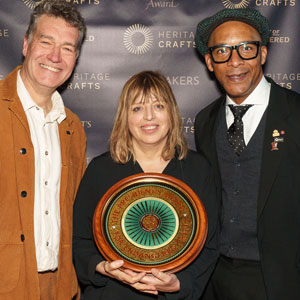
Lucy Barlow with Heritage Crafts Co-Chairs David Clarke and Jay Blades MBE
Straw hat maker Lucy Barlow has won the 2023 President’s Award for Endangered Crafts. The prestigious award, and £3,000 bursary, was initiated by Heritage Crafts’ President the former Prince of Wales.
Heritage Crafts was set up 13 years ago as a national charity to support and safeguard heritage crafts skills, and has become well known for its Red List of Endangered Crafts, the first research of its kind to rank traditional crafts in the UK by the likelihood they would survive the next generation.
The President’s Award trophy was presented to Lucy at a special presentation at St George’s College, Windsor Castle, on Wednesday 15 November 2023.
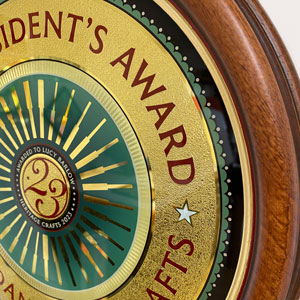
President’s Award 2023 made by Eddy Bennett
Lucy apprenticed with Phillip Somerville of Bond Street in the late 1970s and then went on to Paris to assist master milliner Jean Barthet on the collections of Yves St Laurent, Chanel, Balenciaga, Karl Lagerfeld and Claude Montana. Recently completing an MA in Menswear Millinery at the Royal College of Art, Lucy’s dissertation ‘The Last Straw?’ looks into strategies for the regeneration of the stitch straw industry in the UK. She is a 2019 QEST Garfield Weston Foundation Scholar.
Lucy plans to use the prize to equip her garden workshop so that she can teach machine sewing of straw plait into hats. She would repair historical machines and also invest in new machines that are easier to acquire spare parts for. She plans to focus on finding ways to bring the skill to future generations and involve more diverse communities.
Judges for the Award included Heritage Crafts Co-Chair Jay Blades MBE, Kate Hobhouse (Chair of Fortnum and Mason), Patricia Lovett MBE, Simon Sadinsky (Executive Director of The King’s Foundation), and Johanna Welsh (2022 President’s Award winner).

Klay Evaori by Lucy Barlow
Winner Lucy Barlow said:
“Its now up to me to take the baton of support and recognition for this wonderful craft and use this to power for the good and for future generations.”
Heritage Crafts Executive Director Daniel Carpenter said:
“Many people know the former Prince of Wales as a long-time supporter and champion of traditional craft skills, and his passion is all too evident through initiatives such as the Heritage Crafts President’s Award. Lucy is an immensely deserving winner and we know that in her hands the prize will provide a massive boost to the outlook of this endangered craft.”
The two other finalists for the 2023 President’s Award were Michael Johnson and David French. Michael, the UK’s leading artisan coppersmith operating from Newlyn Copperworks in Cornwall, was awarded a finalist prize of £1,000 donated by former Heritage Crafts Chair Patricia Lovett MBE. David, a fifth generation withy crab and lobster pot maker from Devon, and one of only about ten remaining in the UK, was awarded a finalist prize of £1,000 donated by President’s Award judge and Chair of Fortnum & Mason Kate Hobhouse.
 Deadline: 5pm on Friday 23 February 2024
Deadline: 5pm on Friday 23 February 2024 Many people are dissuaded from training in musical instrument making because of the cost, and therefore the make-up of the sector is not truly representative of the mix of backgrounds that make up the UK as a whole. This bursary has been set up to help cover or subsidise the cost of training for someone who would otherwise be prevented from pursuing this career path as a result of the cost.
Many people are dissuaded from training in musical instrument making because of the cost, and therefore the make-up of the sector is not truly representative of the mix of backgrounds that make up the UK as a whole. This bursary has been set up to help cover or subsidise the cost of training for someone who would otherwise be prevented from pursuing this career path as a result of the cost.

 This training bursary is targeted at trainees and prospective trainees of fashion textile crafts who are experiencing financial hardship. It is sponsored by The Costume Society and is
This training bursary is targeted at trainees and prospective trainees of fashion textile crafts who are experiencing financial hardship. It is sponsored by The Costume Society and is  Many people are dissuaded from training in fashion textile crafts because of the cost, and therefore the make-up of the sector is not truly representative of the mix of backgrounds that make up the UK as a whole. This bursary has been set up to help cover or subsidise the cost of training for someone who would otherwise be prevented from pursuing this career path as a result of the cost.
Many people are dissuaded from training in fashion textile crafts because of the cost, and therefore the make-up of the sector is not truly representative of the mix of backgrounds that make up the UK as a whole. This bursary has been set up to help cover or subsidise the cost of training for someone who would otherwise be prevented from pursuing this career path as a result of the cost. YEAR 2 THEME: ENDANGERED CRAFTS
YEAR 2 THEME: ENDANGERED CRAFTS For 25 years everything about the 17th-century Manor was of profound inspiration to William Morris. Both the Manor and its setting in rural Oxfordshire were a fertile source of ideas, influencing his art, literature and social thinking as well as his passionate, imaginative engagement with history and nature. Integral to Morris’s ethos was his tireless championing of heritage crafts and the handmade. Morris’s values have never been more relevant than they are today.
For 25 years everything about the 17th-century Manor was of profound inspiration to William Morris. Both the Manor and its setting in rural Oxfordshire were a fertile source of ideas, influencing his art, literature and social thinking as well as his passionate, imaginative engagement with history and nature. Integral to Morris’s ethos was his tireless championing of heritage crafts and the handmade. Morris’s values have never been more relevant than they are today. William Morris once described Kelmscott Manor’s beauty and atmosphere as very stimulating to the imagination. We are seeking an MiR who will be as inspired by it as Morris was over 150 years ago, and who can inspire and enthuse others by encouraging creative engagement. The MiR will be a professional working in an endangered craft that features in the 2023 edition of the Red List; we are keen to emphasise to potential applicants that our interest is not limited to practitioners of one of the crafts Morris himself was interested in or practiced.
William Morris once described Kelmscott Manor’s beauty and atmosphere as very stimulating to the imagination. We are seeking an MiR who will be as inspired by it as Morris was over 150 years ago, and who can inspire and enthuse others by encouraging creative engagement. The MiR will be a professional working in an endangered craft that features in the 2023 edition of the Red List; we are keen to emphasise to potential applicants that our interest is not limited to practitioners of one of the crafts Morris himself was interested in or practiced. Heritage Crafts has awarded the grants through its Endangered Crafts Fund, which was launched in 2019 to increase the likelihood of at-risk craft skills surviving into the next generation. Six of this round’s grants are funded by the Sussex Heritage Trust, the Ashley Family Foundation for Wales, and the Essex Community Foundation and were ring fenced for crafts practitioners within those areas.
Heritage Crafts has awarded the grants through its Endangered Crafts Fund, which was launched in 2019 to increase the likelihood of at-risk craft skills surviving into the next generation. Six of this round’s grants are funded by the Sussex Heritage Trust, the Ashley Family Foundation for Wales, and the Essex Community Foundation and were ring fenced for crafts practitioners within those areas. Lucy Mayes from London, to purchase equipment to produce a range of innovative and sustainable pigments from processing construction waste.
Lucy Mayes from London, to purchase equipment to produce a range of innovative and sustainable pigments from processing construction waste. These nine projects follow 57 others awarded in previous rounds, covering endangered crafts such as coppersmithing, Highland thatching, sailmaking and many more. Previous funders have included the Radcliffe Trust, the Pilgrim Trust, the Dulverton Trust, the Swire Charitable Trust and others, as well as individuals who have donated sums from £5 right up to several thousands of pounds.
These nine projects follow 57 others awarded in previous rounds, covering endangered crafts such as coppersmithing, Highland thatching, sailmaking and many more. Previous funders have included the Radcliffe Trust, the Pilgrim Trust, the Dulverton Trust, the Swire Charitable Trust and others, as well as individuals who have donated sums from £5 right up to several thousands of pounds. Traditional sign painter Andrew Grundon has won Maker of the Year in the 2023 Heritage Crafts Awards, which was presented at a prestigious Winners’ Reception at the College of St George, Windsor Castle on 15 November 2023, sponsored by The Royal Mint.
Traditional sign painter Andrew Grundon has won Maker of the Year in the 2023 Heritage Crafts Awards, which was presented at a prestigious Winners’ Reception at the College of St George, Windsor Castle on 15 November 2023, sponsored by The Royal Mint. The President’s Award for Endangered Craft was won by straw hat maker
The President’s Award for Endangered Craft was won by straw hat maker 



